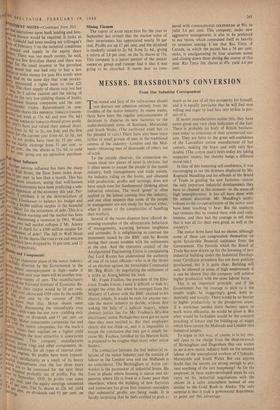MESSRS. BRASSBOUND'S CONVERSION
From Our Industrial Correspondent THE sound and fury of the railwaymen should not distract our attention entirely from the troubles of the motor industry. In recent weeks, there have been the regular announcements of decisions to disperse its new factories to the under-developed areas of Scotland, Merseyside and South Wales. (The north-east coast has so far pleaded in vain.) There have also been more strikes of small groups of men in the traditional centres of the industry-London and the Mid- lands-throwing tens of thousands of others out of work.
To the outside observer, the connection be- tween these two pieces of news is obvious, but it often seems to escape the people in the motor industry, both managements and trade unions. An industry riding on the boom, and obsessed with production, profits and earnings, does not have much time for fundamental thinking about industrial relations. The word 'green' is often applied to the labour coming into the industry, and one often suspects that some of the people in management are not ready for harvest either, when it comes to the complexities of handling their workers.
Several of the recent disputes have offered de- pressing examples of the idiosyncratic behaviour of managements, wavering between toughness and surrender. It is enlightening to contrast the statements issued by the BMC and by Rootes during their recent troubles with the settlements at the end. And the executive council of the Amalgamated Engineering Union is complaining that Lord Rootes has undermined the authority of one of its local officials-who is in the throes of an election against the formidable Communist Mr. Reg. Birch-by negotiating the settlement of a strike at Acton. behind his back.
Mr. Frank Foulkes, the president of the Elec- trical Trades Union, found it difficult to hide his delight the other day when he emerged from the Ministry of Labour with the BMC chained to his chariot wheels. It would be rash for anyone out- side the motor industry to decide, without first seeking the help of a judicial inquiry, where abstract justice lies for Mr. Foulkes's fifty-five electricians' mates. Perhaps they have got no more than they were entitled to. But their employers clearly did not think so, and it is impossible to escape the conclusion that they got it simply be- cause Mr. Foulkes, fortified by his Marxist faith, is prepared to be tougher than many other union leaders.
The connection between the bad industrial re- lations of the motor industry and the scarcity of labour in the London area and the Midlands is no coincidence. The Birmingham or Acton car- worker• is the pacemaker of industrial boom. He lives in places where housing is scarce and ex- pensive, where life is lived at a faster pace than elsewhere, where the building of new factories and extensions has given him constant reminders that substantial profits are being made. It is hardly surprising that he feels entitled to grab much as he can of all this prosperity for himself, and it is equally inevitable that he will find men willing and eager to lead him into strikes in pur- suit of it.
If motor manufacturers realise this, they have never given any very clear indication of the fact. There is probably no body of British business- men today so conscious of their commercial suc- cess. They are heirs to the great self-confidence of the Lancashire cotton manufacturer of last century, making the brass and with very few doubts. (The cotton man's heirs today are taking taxpayers' money, but thereby hangs a different moral tale.) In face of this bounding self-confidence, it was encouraging to see the firmness displayed by Mr. Reginald Maudling and his officials at the Board of Trade in guiding the new factories-almost the only important industrial developments they have to channel at the moment-to the areas of high unemployment. It has all been done with the utmost discretion. Mr. Maudling's public tributes to the co-operativeness of the motor men have been touching to hear. But the stubborn fact remains that he treated them with cool ruth- lessness, and then had the courage to tell them that it was all for their own good, as well as the country's.
The motor firms have had no choice, although some of them can congratulate themselves on quite favourable financial assistance from the Government. The formula which the Board of Trade has now drawn up for the licensing of new industrial building under the Industrial Develop- ment Certificate procedure has not been publicly proclaimed, but it is quite clear. Building will only be allowed in areas of high employment if it can be shown that the company will achieve higher production with the same labour force. This is an important principle, and if the Government has the courage to stick to it the results might be staggeringly good, both in- dustrially and socially. There would be no barrier to higher productivity in the prosperous areas; if a workman needed more factory space to work more efficiently, he would be given it. But what would be forbidden would be the constant poaching of labour and the bidding-up of wages which have turned the Midlands and London into industrial jungles.
To argue in this way, of course, is to lay one- self open to the charge from the shop-stewards of Birmingham and Dagenham that one wishes to see a new motor industry built on the sweated labour of the unemployed workers of Clydeside, Merseyside and South Wales. But can anyone doubt that the unions are strong enough to pre- vent anything of the sort happening? As for the employer, in these under-developed areas he can carry on his industrial negotiations with the unions in a calm atmosphere instead of one similar to the Gold Rush in Alaska. The only surprise is that it took a government department to point out this advantage.






































 Previous page
Previous page